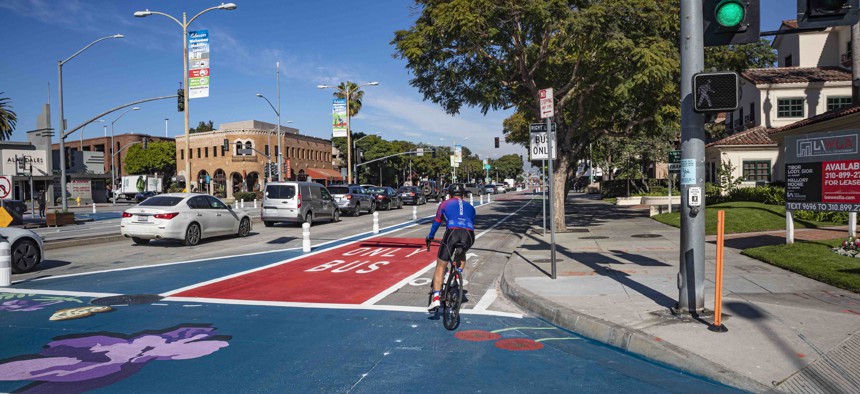Feds Call for State-Local Cooperation on Pedestrian and Cyclist Safety

Infrastructure for vulnerable users includes bike lanes, crosswalks and signals that allow pedestrians to cross before vehicles. Citizen of the Planet/UCG/Universal Images Group via Getty Images

Connecting state and local government leaders
The Biden administration is urging state DOTs to turn to local governments as they plan for projects to make streets safer for people outside of vehicles.
The Biden administration is pushing state transportation departments to work with local leaders to reduce the number of vehicle crashes involving pedestrians, cyclists and other vulnerable street users.
The Federal Highway Administration’s emphasis on states working with local governments and community groups comes as part of the agency’s directions for complying with the 2021 infrastructure law. The $1.2 trillion package requires states to assess the safety of vulnerable users on their roads by next November, and to develop strategies or identify projects that can help keep those people safe.
The additional reporting requirement comes as non-motorists have become a larger share of the people killed in traffic crashes. About a fifth of all road deaths in 2021 were people who were not in vehicles.
“It is up to all of us to keep those who walk, bike or roll safe as they travel,” Transportation Secretary Pete Buttigieg said in a statement. “Because of the Bipartisan Infrastructure Law, states have new resources to improve safety for vulnerable travelers, make our roads safer and more accessible for all, and help move us closer to reaching the ultimate vision of zero fatalities.”
The highway agency’s 19-page guidance document fleshes out how states can comply with the new reporting mandate. But the recommendations do not have the force of law.
In fact, many agencies, particularly from Republican-led states, have criticized the Biden administration for emphasizing its priorities in previous guidance materials that, they say, go beyond what Congress included in the Infrastructure Investment and Jobs Act.
But the Biden administration has stuck with its approach, including in the guidance released Friday.
And Buttigieg reinforced the message when he addressed a convention of the American Association of State Highway and Transportation Officials in Florida last week.
“Not just dedicated highway safety dollars but every penny [of state transportation funding] could and should do something about transportation safety,” Buttigieg told the group. “There are lives at stake. In the military, if you save three lives on the battlefield, you win a medal. Yet everyone at this table has a chance to save hundreds of lives every day.”
As part of the infrastructure law, states must compile data on vehicle crashes involving non-motorists. They also are required to track demographic data about the people killed in those crashes, and in the areas where the crashes occurred.
The FHWA encouraged states to use outside sources of information, including local governments, while assembling that data. It also recommended that state agencies work with other groups in places where fatalities and serious injuries are high. That approach, the federal agency noted, would promote the Biden administration’s goal of racial equity, because non-white road users make up a disproportionate share of traffic deaths.
“This guidance can help states identify what safety issues for those outside of a vehicle need to be addressed and where,” said Stephanie Pollack, the acting head of the FHWA.
“States are then positioned to incorporate the results as they make decisions about their safety investments. It also improves transportation equity by making sure extensive dialogue with relevant stakeholders takes place and the concerns of those most at risk in towns, cities and underserved communities are heard through better public engagement at the local level,” she added.
The document encouraged states to identify projects that separate different types of road users in time and space, with features such as bike lanes, pedestrian islands, leading pedestrian intervals on stoplights, removing vehicle travel lanes and adding warning devices for pedestrian crossings.
Daniel C. Vock is a senior reporter for Route Fifty based in Washington, D.C.

NEXT STORY: After Uvalde, states look to new digital maps to keep schools safe





